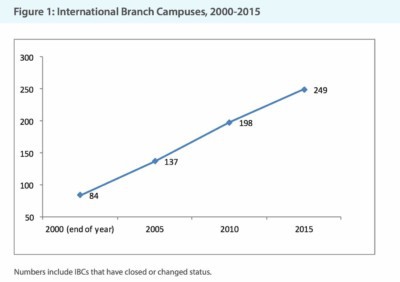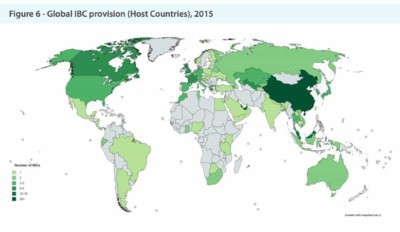A recent survey of potentially mobile international students by Hobsons showed that there was potentially significant demand for branch campus provision in post-Brexit Europe should a UK university decide to open one.
- 76% of EU students said that if a UK university opened a branch campus in an EU country other than their own they would be very likely or somewhat likely to study there (23% very likely, 53% somewhat likely, 16% not likely, 9% not sure**).
- 69% of Non-EU students said that if a UK university opened a branch campus in an EU country they would be very likely or somewhat likely to study there (32% very likely, 37% somewhat likely, 17% not likely, 14% not sure).
- 58% of EU students stated that if a UK university opened a branch campus in their home country they would be very likely or somewhat likely to study there (28% very likely, 30% somewhat likely, 36% not likely, 6% don’t know). A significant percentage however (36%) said that they would not be likely to study there, suggesting that they would still prefer to study in the UK or elsewhere, away from their home country, to have the full international study experience.
- 42% of EU and Non-EU students stated that they would have a much better perception or a better perception of a UK university if it opened a branch campus in an EU country, while 42% said this would make no difference to their view of the institution (17% much better perception, 25% better perception, 42% no change, 6% worse perception, 1% much worse perception, 9% don’t know).
The Evening Standard was one of many outlets to report excitedly that Oxford University was looking to open a branch campus in Paris:
Oxford University may open its first ever campus overseas because of Brexit.
French officials have held talks with Oxford University about opening a sister campus in Paris, a move which could guarantee the university European funding after Brexit, The Telegraph reported.
Oxford and other British universities, including Warwick, have been told that any campus they open in France would enjoy French legal status and could therefore continue to receive European funding.
Jean-Michel Blanquer, a former director-general of the French ministry of education, confirmed to the paper that discussions between British universities and the French government were taking place.
The suggestion though was rapidly rebutted by Oxford (although not by Warwick, the only other university named in the piece).
The growth of branch campuses
There remains a view that branch campuses really are no longer the way forward for transnational education and that strategic partnerships are the best way forward. However, the number of such operations continues to grow. At the end of 2016 the Observatory on Borderless Higher Education published a new report on branch campus growth which showed some significant growth and interesting developments.
The total number of international branch campuses has grown to 249, up by a quarter since the last survey, although the rate of growth has slowed a little. However, there are about 20 branch campuses under development, so even if expansion is slower, it is undoubtedly continuing. A reminder of the overall picture:

Interestingly, quite a few more countries are now involved, as host (nine new countries), as home (six new) or as both (six new countries):
New home countries include Belgium, Estonia, Japan, South Korea, Turkey and Taiwan. Since 2011, nine countries have become new hosts to IBCs: Cyprus, Egypt, Finland, Ghana, India, Malta, Nicaragua, Rwanda, and Saudi Arabia.
Five home countries – United States, the United Kingdom, Russia, France and Australia – together account for nearly three quarters of all IBCs and growth and planned developments are largely from US and European universities. The top host countries and areas of growth are perhaps unsurprising:
The top five host countries are China (32), the United Arab Emirates (31), Singapore (12), Malaysia (12), and Qatar (11), which together host 98 IBCs, or 39% of the world’s total. China has overtaken UAE as the top host country. The number of IBCs continues to increase, with concentrated growth in China, Malaysia, Mauritius and South Korea from 2011-2015 and slowed growth in UAE.
The numbers though remain small and according to the OBHE there are only around 180,000 students worldwide enrolled in branch campuses, which is less than 4% of the estimated 5 million mobile students.
The UK response – remaining international
There are, of course, many ways for UK universities to respond to the need to retain their international outlook in what will undoubtedly be an extraordinarily challenging post-Brexit environment. The branch campus option is one of these, although I do think the easy way in which they are often discussed usually fails to take account of the extraordinary efforts required to establish a whole campus in another country.
UK universities – whatever the difficulties Brexit creates and the obstacles it will present – have to retain their international ethos. Universities have had an international outlook since the beginning. Whilst some aspects of internationalisation have moved on since the middle ages, some principles remain clear, including the need to look beyond income generation as a motive.
The University of Nottingham has been at the forefront of international activity for decades and has grown it to the point where we have over 9,000 international students from over 150 countries at our campus in the UK, over 12,000 students studying at our campuses in Malaysia and China, and well over 20% of our UK-based students engaged in some form of international mobility.

The University of Nottingham, Ningbo, China
25% are our staff are international, aspects of the curriculum are highly internationalised, we are members of international networks and have many international research and knowledge transfer partnerships as well as a range of focused international partnerships covering articulations and in country delivery as well as capacity development. 17% of published research outputs are internationally co-authored and 37% of our research funding is obtained internationally. We have strategic partnerships with other leading universities in over 25 countries and one of the largest scholarship programmes for students from the developing world.
The benefits of internationalisation
A genuinely internationalised university brings huge benefits for its home country as well as those in which it operates. It is essential to be clear about motivations and objectives though. Whilst some governments may see both economic and soft power benefits from exporting HE and others may welcome incoming universities’ contributions to growth and capacity building, the impact of universities’ international activities is complex and multi-faceted and the practicalities of delivery are hugely challenging.
Nottingham, like many other universities, sees the huge importance and advantages of a strong international strategy. In our case this does include those two campuses in Asia. But establishing an overseas campus is very far from straightforward. Challenges range from building the infrastructure to restructuring institutional and local governance. Legal issues, financial arrangements, and developing local management can take time and significant effort, as can coming to terms with an entirely new academic, political, and cultural framework. We have built close relationships based on trust and taken the long-term view with our partners. Major new opportunities in teaching, student exchanges and research collaboration have hugely enriched Nottingham’s environment and ethos; our campuses in Asia confer great benefits in terms of the student experience, and this can be equally transformative for students from the UK who spend time studying in China and Malaysia.
Putting in the hard work
To leverage the full benefit of an international campus, though, an institution must have a strategy that goes beyond thinking about cash-generation. The management input required is high, and there are inevitably opportunity costs. The investment is substantial, but it is worth it for a university committed to an international vision that goes beyond generating income from overseas student fees. Such a global footprint therefore has real impact for the institution, its students, staff, and stakeholders as well as for the governments and society at home and in the countries with which it is deeply engaged. This real and comprehensive international impact though is therefore about much more than just the money.
When universities make claims about their global outlook and deep internationalisation there is a tendency for the rhetoric significantly to outstrip the reality. Nottingham is, I think, a bit different. The evidence for the range and depth of the internationalisation is pretty much everywhere and is now part of the fabric, culture and practice across the University.

UK universities will undoubtedly want to consider seriously the opportunity to develop branch campuses on the continent, especially where there is strong encouragement from the host country. But this is a step which cannot be taken lightly. It is not a tactical move just to be undertaken in response to one, admittedly very positive, student survey but something which will require significant and sustained commitment.
The benefits will accrue, over time, but any university which does go down this road must be confident about its strategy and be prepared to invest time, effort and resources for the long term.














Specific information about it and thanks for sharing with us.
The UK’s QAA and Dubai’s KHDA, with input from Hong Kong’s HKCAAVQ are hosting a joint fringe event at Going Global on Monday 22 May on ‘Rise of global campuses: impact on quality assurance’ – https://www.britishcouncil.org/going-global/programme/fringe-events/rise-global-campuses-impact-quality-assurance
Speakers from global universities – Amity University, Heriot Watt University, Hult-Ashridge and Nottingham University as well as students who have studied on branch campuses.